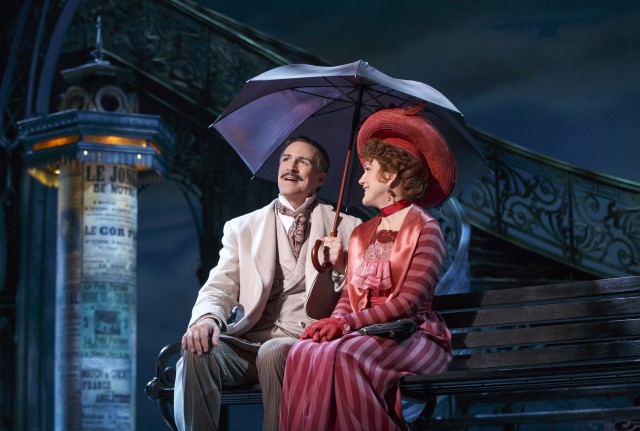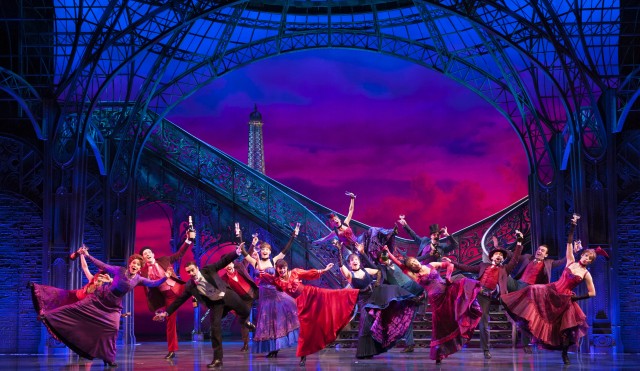Neil Simon Theatre
250 West 52nd St. between Broadway & Eighth Ave.
Tuesday – Sunday through June 21, $67-$147
gigionbroadway.com
In the Oscar-winning title song of Gigi, Gaston Lachaille asks, “When did your sparkle turn to fire / and your warmth become desire?” In the new Broadway revival at the Neil Simon Theatre, there is plenty of sparkle and warmth, but little fire and desire, making for a perfectly pleasant evening that never quite hits the high notes of this story of love and extravagance in fin de siècle Paris. Gigi began life as a 1944 novella by Colette, which was turned into a 1949 French comedy starring Danièle Delorme as the sixteen-year-old girl on the brink of womanhood. It then became a Broadway hit written by Anita Loos in 1951 and starring Audrey Hepburn, followed by Vincente Minnelli’s smash 1958 Lerner and Loewe musical, which was nominated for nine Oscars, including Best Picture, Best Director, and Best Original Score, and won them all. Twenty-five years later it was turned into a Broadway musical by Alan Jay Lerner (book and lyrics) and Frederick Loewe (music) that won a Tony for Best Score but failed to catch on with the public. Which brings us to the current, first-ever Broadway revival, a modestly entertaining if not exactly illuminating version adapted by British screenwriter and playwright Heidi Thomas (Cranford, Call the Midwife), who has scrubbed clean this tale of accepted high-society prostitution, significantly lessening the age difference between the main characters, Gigi and Gaston, portrayed by former Disney stars Vanessa Hudgens (High School Musical) and Corey Cott (Newsies), respectively. In fact, Hudgens is fifteen months older than Cott; in comparison, ten years separated Leslie Caron and the older Louis Jourdan in the movie musical. In addition, the signature song, “Thank Heaven for Little Girls,” is no longer sung by Gaston’s uncle, Honoré, who was most famously played by Maurice Chevalier, but instead by Gigi’s grandmother, Mme. (Mamita) Alvarez (Victoria Clark), and great-aunt, Alicia (Dee Hoty), completely eliminating any hint of lewdness. As far as the plot goes, Gaston is a very wealthy steampunk bon vivant who dreams of flying. He is experiencing problems with his mistress, Liane d’Exelmans (Steffanie Leigh), and might soon be in search of his next lover, which excites Aunt Alicia, who has been grooming Gigi to prepare her to become a gentleman’s courtesan, one of the class of Parisian women who get rewarded handsomely for their “services.” The idealistic Gigi might not be all about girl power, but she still believes she can make her own choices, setting up the major conflict of the show.

Honoré Lachaille (Howard McGillin) and Mamita (Victoria Clark) remember it well in GIGI (photo © Joan Marcus)
Gigi has a delightful score, featuring such memorable songs as “The Parisians,” “Thank Heaven for Little Girls,” and “The Night They Invented Champagne.” Hudgens sings and dances well, although she strains at overpronouncing her “t”s in dialogue. Hoty (Footloose, The Will Rogers Follies) overplays Aunt Alicia; the scenes in which she trains Gigi in the art of being a mistress fall flat. Former Phantom of the Opera McGillin is fine as Honoré, delivering a lovely “I Remember It Well” with Clark (The Light in the Piazza, Cinderella), who is the strongest part of the show. The weakest is Cott, who lacks the charm and elegance necessary for the role of the man every woman in Paris wants; the program lists his only experience other than Newsies as university productions, so he might need more time to blossom. Derek McLane’s flashy set is structured around the base of the Eiffel Tower as it changes from posh nightclub to fashionable beach resort to Mamita’s and Alicia’s very different living quarters. Director Eric Schaeffer (Follies, Million Dollar Quartet) never really achieves a flow to the narrative, resulting in a bumpy progression of set pieces. It might never all quite gel, and the production magnifies the dated nature of the central story, but it still makes for a nice show. It’s not a bore, but you might not remember it very well either.
